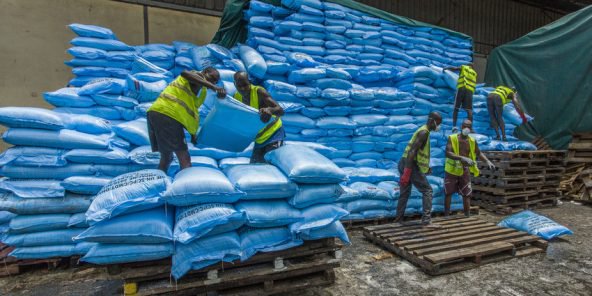La production d’engrais bio est encore embryonnaire en Afrique. Et pourtant : le Béninois Gildas Zodome a fondé Bio Phyto Collines sur ce principe et connaît un fort développement continental.
La part de bio sur le marché des engrais ? « Cela ne représente quasiment rien », affirme un expert indépendant des intrants. On estime en effet que le marché des engrais bio (fumier, feuilles et compost) représente seulement 2 milliards d’euros au niveau mondial contre 150 milliards d’euros pour le conventionnel, soit à peine plus de 1% du marché des intrants agricoles.
En Afrique, c’est encore plus vrai qu’ailleurs. Si le continent, tous pays confondus, ne pèse pas plus de 5% de la consommation mondiale d’engrais, ce sont plutôt les apports en fertilisants minéraux (azote, phosphate, potasse) qui ont la cote. Les volumes utilisés en Afrique ont bondi de 130% entre 2008 et 2015 d’après le Centre international de développement des engrais (IFDC).
Les industriels attirés par le potentiel africain des engrais
Ce taux de croissance attire les industriels des quatre coins du globe : le groupe de construction Orascom en Égypte, l’américain Monsanto dans le coton burkinabè, le chinois CGC Overseas Construction au Cameroun, le pakistanais Engro qui envisageait d’injecter la bagatelle d’un milliard de dollars dans les engrais au Maghreb, l’Office chérifien des phosphates au Maroc qui produira 2,5 millions de tonnes d’engrais par an pour les agriculteurs éthiopiens….
Les enjeux sont de taille : il s’agit de conduire le train de la révolution verte africaine dans une région encore frappée par la plus forte concentration de sous-nutrition au monde, et une productivité agricole encore loin d’y répondre (jusqu’à 1,8% du niveau de productivité agricole des pays développés).
Mais derrière cette effervescence, les critiques du « tout chimique » en agriculture, très fortes dans les pays développés, commencent aussi à donner de la voix en Afrique. Arguments à l’appui : le coût élevé de ces intrants, leur difficile acheminement dans des zones rurales reculées, leur piètre qualité fertilisante, encore épinglée par l’IFDC dans un rapport de mars 2013, l’impact sur la santé des exploitants qui souvent pratiquent l’épandage sans matériel de protection, leur responsabilité dans la présence de perturbateurs endocriniens…
L’alternative des bio fertilisants
C’est fort de ce même constat qu’un doctorant de 33 ans à l’Université d’Abomey-Calavi de Cotonou (UAC) a décidé de mettre sur pied sa propre activité de production de pesticides et d’engrais bio après avoir constaté la récurrence de pathologies parmi les agriculteurs ayant recours à des intrants de synthèse.
« Diarrhées, évanouissements, intoxication. Le phénomène est très connu », détaille Gildas Zodome, ancien représentant local à Glazoué (centre-sud) de plusieurs institutions publiques d’assistance au secteur agricole, dont le Centre régional pour la promotion agricole du Bénin (Cerpa) et l’Institut national des recherches agricoles du Bénin (Inrab).
Il lui a fallu deux ans pour aboutir aux premiers prototypes, conçus à partir d’un mélange de plantes aromatiques (eucalyptus, graines du margousier – également dénommé neem – oranger, hyptis…), et inspirés par les méthodes de contrôle des ravageurs et de fertilisation utilisées par ses aïeux. Une dizaine d’essences réparties différemment selon les recettes dont il garde jalousement le secret, d’autant qu’il les a faites breveter.
Moins cher pour plus de rendement
Testés sur plusieurs exploitations agricoles, auprès de paysans et auprès des chercheurs de l’Inrab, seuls les pesticides et les engrais les plus performants sont désormais distribués. Trois références que l’entrepreneur-agronome fait rayonner hors de ses frontières, comme au Burkina, où la société a bénéficié de l’assistance de l’incubateur d’entreprises la Fabrique, au Niger, à Madagascar et bientôt au Togo.
Ses produits représentent une bonne affaire pour les exploitants, assure-t-il. À commencer par le prix : 10 000 francs CFA le sac de 50 kilos (environ 15 euros). « Les engrais chimiques sont plutôt à 17 000 francs CFA le sac au Bénin, voire 12 000 s’ils sont subventionnés », explique-t-il. Pour les pesticides, les prix se calent sur la concurrence, à 5 000 francs le litre.
Et les rendements suivent, d’après Gildas Zodome. « Sur un hectare en riziculture, nous avons mesuré une production moyenne de 4 tonnes de riz avec nos produits, contre 3 tonnes avec des intrants chimiques, et une marge économique supplémentaire de 50 000 francs CFA », assure-t-il.
Bio Phyto Collines compte désormais neuf salariés permanents à Allada, la ville de naissance du fondateur, où elle dispose d’un hectare de culture de plantes aromatiques, le reste étant acquis à l’extérieur auprès de fournisseurs. Avec 400 tonnes d’engrais produites chaque année et 15 000 litres de bio-pesticides, la société atteint un chiffre d’affaires de 100 millions de francs CFA (150 000 euros).
Objectif : multiplier par cinq sa production
D’autres sont positionnés sur le même créneau, comme Éléphants verts au Maroc et au Mali ou Safi Organics au Kenya, mais les possibilités de croissance sont considérables.
Bio Phyto Collines espère multiplier sa production par cinq d’ici trois ans.


Leave a Reply